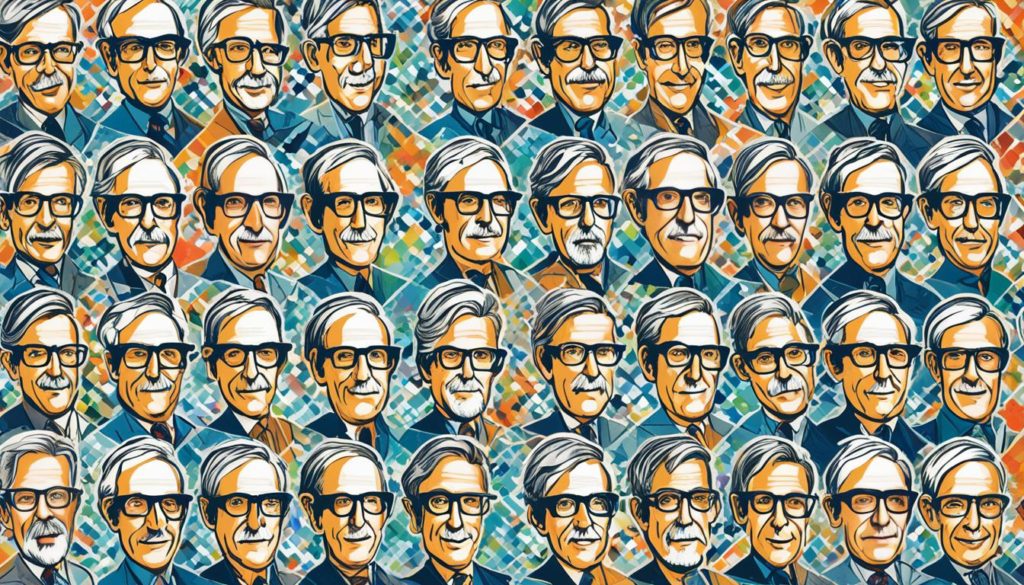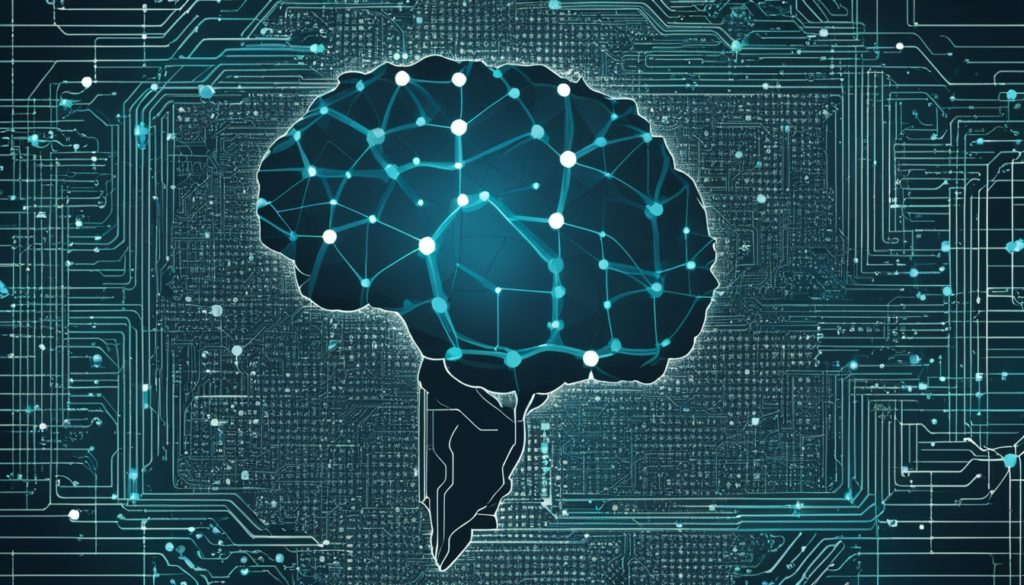
In the 19th century, the journey towards the digital age began. It’s a less known fact that Ada Lovelace, a forward-thinker, emerged as the first computer programmer. She worked with Charles Babbage on the Analytical Engine. Today, the tech world we navigate every day has deep roots in the work of pioneers in computer science.
These renowned tech innovators changed everything. Figures like Alan Turing and Grace Hopper are not just important in computing history. They built the digital world we live in now.
The story of technology and the internet is tied to these top computer scientists. Their brilliant minds and forward thinking gave us the basics of personal computers, various programming languages, and the internet we all value. Thanks to influential tech visionaries like John von Neumann and Sir Tim Berners-Lee, we live in a connected world today.
Key Takeaways
- Uncover the captivating beginnings of computer programming with Ada Lovelace, the pioneer who set the stage for future innovations.
- Discover how Alan Turing’s genius laid a theoretical foundation that has become the cornerstone of computer science as we know it.
- Recognize Grace Hopper’s groundbreaking role in developing the first compiler, which brought about transformation in programming.
- Contemplate the substantial influence of John von Neumann in shaping the architecture of the computers we use daily.
- Reflect on the considerable impact that Sir Tim Berners-Lee’s invention of the World Wide Web has had on global connectivity.
The Genesis of Computing: Key Figures in Early Computer Science
When we look back at computing’s history, influential computer scientists stand out. Ada Lovelace and Charles Babbage laid the groundwork for today’s technology. Lovelace, working with Babbage on his Analytical Engine, became one of the first to devise an algorithm. She is celebrated not only as a visionary in computing but also as a trailblazer for future tech pioneers. Discover more about these programming language pioneers.
Charles Babbage is also honored for his groundbreaking work. He and Lovelace foresaw computers doing much more than just calculations. They imagined machines that could create art and music, showing early belief in computers’ creative potentials.
After World War II, technology leaped forward with the ENIAC’s development. The 1950s began a tech revolution, setting the stage for today’s digital world.
Looking at theoretical computer science foundations, it’s clear early pioneers set a strong base. Ada Lovelace’s algorithms and Babbage’s computational designs are deeply ingrained in today’s tech. Their work supports and drives the field’s growth into a diverse discipline.
In honoring these influential computer scientists, we celebrate their lasting contributions. They have profoundly influenced our tech landscape. Their dream of a programmable world inspires today’s developers and engineers, keeping innovation alive in computer science.
Influential Computer Scientists and Their Legacy
The impact of key figures in computer science has been huge. Pioneers like Alan Turing, Grace Hopper, and John von Neumann have made big marks in technology. They introduced ideas and devices that shape how we use digital tools today.
The Vision of Alan Turing: A Forefather of Theoretical Computer Science
Alan Turing was a major player in theoretical computer science. He introduced the Turing machine and the Turing Test. His ideas helped start the field of artificial intelligence. Turing’s work was very practical too. He cracked the German Enigma code in WWII, mixing smart theory with real action.
Grace Hopper’s Contribution to Computer Programming Languages
Grace Hopper radically changed computer programming. She developed the first compilers, making the COBOL programming language better. Thanks to her, programs could work on different machines, not just one. A fun fact about Hopper is the origin of “debugging” in tech. She found a moth in a device once, showing the hands-on problems of early computing.
John von Neumann’s Architectural Influence on Modern Computing
John von Neumann greatly influenced computer architecture. He came up with the stored-program concept in the Von Neumann architecture. This design is still used in most computers today. Von Neumann was skilled in many areas, mixing computing with game theory and quantum mechanics.
These geniuses have left a lasting impact on technology. Their work helps us face new challenges with modern tools. Turing, Hopper, and Von Neumann not only give us knowledge. They inspire us to innovate.
The Architects of the Internet and the World Wide Web
Exploring the World Wide Web‘s history highlights Sir Tim Berners-Lee’s significant impact. He invented the first web browser and server. He also made HTML, changing how we find and share information. His work changed digital communication forever.
Vint Cerf and Robert Kahn also played crucial roles. They created internet protocols that connect the network. Their TCP/IP protocols make the servers and web browsers talk to each other well. This made the internet very strong and adaptable.
- HTTP: The protocol that powers the web
- HTML: The markup language for creating web pages
- Web Browsers: Bridge between users and the vast data on the web
- Servers: Store, process, and deliver web pages to users
Component Description Contributor HTML Markup language for creating websites Tim Berners-Lee TCP/IP Core protocols of the Internet Vint Cerf & Robert Kahn First Web Browser Interface for accessing HTML documents Tim Berners-Lee Advancements in Artificial Intelligence and Machine Learning
The field of artificial intelligence has grown fast. It’s all thanks to experts combining cognitive science with advanced algorithms. From the basic parts of AI robotics to discussions at the Dartmouth Conference, every piece has been crucial.
Marvin Minsky: An Authority on Artificial Intelligence
Marvin Minsky greatly helped develop artificial intelligence. At the MIT Media Lab, he created a strong base for future AI work. His research into neural networks helped create today’s complex algorithms.
John McCarthy’s Groundbreaking Work in AI and Programming
John McCarthy is known for creating the term ‘artificial intelligence.’ He organized the important Dartmouth Conference, making AI a recognized field. He invented the Lisp programming language, a big advancement for AI and science. McCarthy received the Turing Award for his work.
Innovator Contribution Award Received Marvin Minsky Advances in neural networks and robotics MIT Media Lab founder John McCarthy Development of Lisp programming language Turing Award, National Medal of Science Today, we are living in a boom of technology. The work of these great minds in artificial intelligence and machine learning shapes not only new tech but also its use in different fields.
Programming Language Innovators and Their Enduring Impact
The tech world today has been molded by innovators. Their work in programming languages and systems has changed our digital interactions. These pioneers created tools and ideas that still impact computing today.
The Universality of James Gosling’s Java
Java programming language is everywhere thanks to James Gosling. Its principle, “write once, run anywhere”, means Java works the same across all devices. This has made Java a top choice for web and mobile apps everywhere.
Donald Knuth’s Contributions to Computer Programming and Algorithms
Donald Knuth wrote The Art of Computer Programming. His book covers algorithms, data structures, and program efficiency, core areas in computer science. His work on the TeX typesetting system highlights his dedication to precision and influence in academia. Knuth’s efforts have made computing more efficient and inspired many programmers.
Linus Torvalds and the Rise of Linux: An Open-Source Milestone
Linus Torvalds made the Linux operating system, showing the strength of open-source software. He made Linux free for everyone, sparking innovation and collaboration. This has pushed Linux’s use in many industries. His development of the Git version control system is also fundamental for software development workflows worldwide.
These innovators have deeply influenced software development and technology use today. Their ideas and creations guide today’s programmers and developers. They ensure technology’s growth and its role in our everyday lives.
The Role of Mathematics and Logic in Computing’s Evolution
In computing’s epic journey, computational mathematics and computational logic play pivotal roles. They’ve shaped theories and fueled the programming that powers our tech today.
Computational logic has been key in creating methods for computing machines. These methods not only work the machines but also manage complex decisions. From simple calculators to the AI algorithms of today, this link is crucial.
Concept Contribution to Computational Mathematics Impact on Modern Programming Paradigms Algebraic Algorithms Foundational techniques for problem-solving and computation Essential in the development of functional and procedural code Formal Logic Framing logical constructs that are essential for programming Crucial for developing advanced software architectures Data Structures Organizing data for efficient access and manipulation Core component of efficient, scalable programming Through tech’s history, the importance of algorithms and data structures stands out. They’re not just theory; they improve software on all platforms. Through better search algorithms or data handling, their effect is huge.
- Computational Mathematics: Drives the creation of numerical methods for computational simulation.
- Computational Logic: Underlies the verification processes ensuring software reliability and security.
- Algorithms and Data Structures: Facilitate the development of efficient, responsive applications.
- Programming Paradigms: Influence the design and structuring of software solutions.
Looking at the past and present, it’s seen that computational mathematics remains key. Its focus on numbers and algorithms continues to spark innovation in computer science.
Conclusion
We’ve traveled through computer science history, seeing the mark of groundbreaking computer engineers and notable computer scientists. They changed what we thought possible and built our tech world. From Ada Lovelace’s early algorithms to Alan Turing’s work and Tim Berners-Lee’s web, they show us the way.
These pioneers’ tireless curiosity and brilliance sparked our digital age. The impact of these tech innovators on modern society is huge. Their achievements affect how we talk and handle information today. They solved big challenges and prepared the future for new discoveries.
It’s our turn to keep their legacy alive by encouraging fresh ideas and bold ventures in computing. Their lifeworks give us a solid ground and a light guiding us forward. We aim to push tech limits, making sure our digital world keeps growing and connecting everyone.
FAQ
Who are considered the top influential computer scientists who shaped technology?
Leaders like Ada Lovelace, Alan Turing, and Grace Hopper were key in shaping tech. John von Neumann, Sir Tim Berners-Lee, and others also made big contributions. They helped create the internet, open-source software, and more.
What was Ada Lovelace’s contribution to early computer science?
Ada Lovelace was the first computer programmer. She worked on the Analytical Engine. Lovelace saw computers could do more than just math, like creating art and music.
How did Alan Turing influence theoretical computer science?
Alan Turing’s ideas were foundational in computer science. He introduced the Turing machine. Turing also set the stage for artificial intelligence with his Turing Test and helped break German codes in WWII.
What was Grace Hopper’s legacy in computer programming languages?
Grace Hopper significantly impacted programming languages. She created the first compiler. Hopper also helped in developing COBOL, making programming easier and more accessible.
What is the Von Neumann architecture?
The Von Neumann architecture is a key computer design. It stores data and programs in the same memory. This design was foundational for modern computers.
How did Sir Tim Berners-Lee contribute to the internet and the World Wide Web?
Sir Tim Berners-Lee invented the World Wide Web. He made the first browser, server, and HTML. Berners-Lee’s work made the internet user-friendly and widely accessible.
What are Marvin Minsky’s and John McCarthy’s advancements in artificial intelligence?
Marvin Minsky explored neural networks and AI. John McCarthy introduced the term “artificial intelligence” and made Lisp programming language. Their work pushed machines to simulate human thinking.
How did James Gosling change programming with Java?
James Gosling introduced Java, emphasizing “write once, run anywhere.” Java’s versatility has made it essential in web development and various applications.
Why is Donald Knuth’s work important to computer programming?
Donald Knuth’s “The Art of Computer Programming” guides programmers. His analysis of algorithms improves code efficiency. Knuth’s TeX system also enhanced academic publishing.
What is the significance of Linus Torvalds’s Linux and Git?
Linus Torvalds developed Linux, offering an open-source option to Unix. He also made Git, aiding programmers in managing software development collaboratively.
How have mathematics and logic influenced the evolution of computing?
Math and logic are crucial in computer science. They help in creating algorithms, designing data structures, and developing software. Early efforts to combine these disciplines still impact computing today.
Future App Studios is an award-winning software development & outsourcing company. Our team of experts is ready to craft the solution your company needs.










